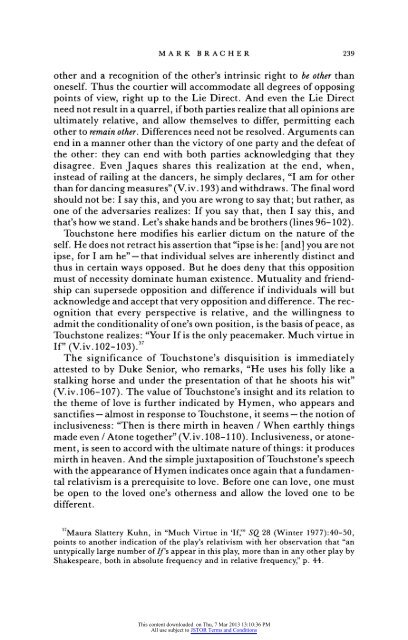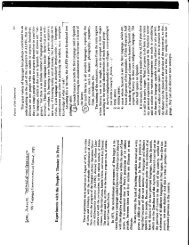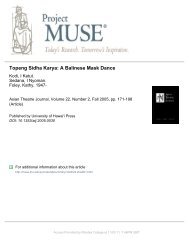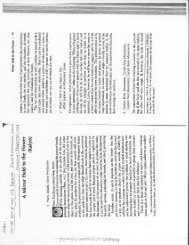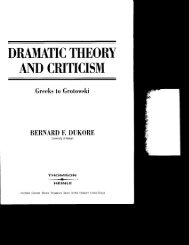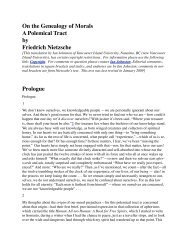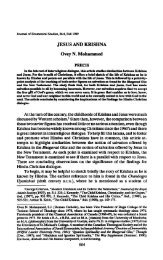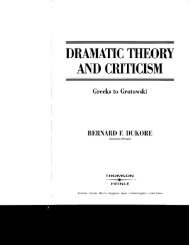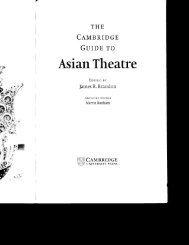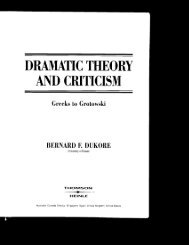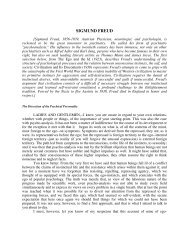Contrary Notions of Identity in As You like It - Yavanika
Contrary Notions of Identity in As You like It - Yavanika
Contrary Notions of Identity in As You like It - Yavanika
You also want an ePaper? Increase the reach of your titles
YUMPU automatically turns print PDFs into web optimized ePapers that Google loves.
MARK<br />
BRACHER<br />
239<br />
other and a recognition <strong>of</strong> the other's <strong>in</strong>tr<strong>in</strong>sic right to be other than<br />
oneself. Thus the courtier will accommodate all degrees <strong>of</strong> oppos<strong>in</strong>g<br />
po<strong>in</strong>ts <strong>of</strong> view, right up to the Lie Direct. And even the Lie Direct<br />
need not result <strong>in</strong> a quarrel, if both parties realize that all op<strong>in</strong>ions are<br />
ultimately relative, and allow themselves to differ, permitt<strong>in</strong>g each<br />
other to rema<strong>in</strong> other. Differences need not be resolved. Arguments can<br />
end <strong>in</strong> a manner other than the victory <strong>of</strong> one party and the defeat <strong>of</strong><br />
the other: they can end with both parties acknowledg<strong>in</strong>g that they<br />
disagree. Even Jaques shares this realization at the end, when,<br />
<strong>in</strong>stead <strong>of</strong> rail<strong>in</strong>g at the dancers, he simply declares, "I am for other<br />
than for danc<strong>in</strong>g measures" (V.iv. 193) and withdraws. The f<strong>in</strong>al word<br />
should not be: I say this, and you are wrong to say that; but rather, as<br />
one <strong>of</strong> the adversaries realizes: If you say that, then I say this, and<br />
that's how we stand. Let's shake hands and be brothers (l<strong>in</strong>es 96-102).<br />
Touchstone here modifies his earlier dictum on the nature <strong>of</strong> the<br />
self. He does not retract his assertion that "ipse is he: [and] you are not<br />
ipse, for I am he" - that <strong>in</strong>dividual selves are <strong>in</strong>herently dist<strong>in</strong>ct and<br />
thus <strong>in</strong> certa<strong>in</strong> ways opposed. But he does deny that this opposition<br />
must <strong>of</strong> necessity dom<strong>in</strong>ate human existence. Mutuality and friendship<br />
can supersede opposition and difference if <strong>in</strong>dividuals will but<br />
acknowledge and accept that very opposition and difference. The recognition<br />
that every perspective is relative, and the will<strong>in</strong>gness to<br />
admit the conditionality <strong>of</strong> one's own position, is the basis <strong>of</strong> peace, as<br />
Touchstone realizes: "<strong>You</strong>r If is the only peacemaker. Much virtue <strong>in</strong><br />
If" (V.iv. 102-103).37<br />
The significance <strong>of</strong> Touchstone's disquisition is immediately<br />
attested to by Duke Senior, who remarks, "He uses his folly <strong>like</strong> a<br />
stalk<strong>in</strong>g horse and under the presentation <strong>of</strong> that he shoots his wit"<br />
(V.iv. 106-107). The value <strong>of</strong> Touchstone's <strong>in</strong>sight and its relation to<br />
the theme <strong>of</strong> love is further <strong>in</strong>dicated by Hymen, who appears and<br />
sanctifies - almost <strong>in</strong> response to Touchstone, it seems - the notion <strong>of</strong><br />
<strong>in</strong>clusiveness: "Then is there mirth <strong>in</strong> heaven / When earthly th<strong>in</strong>gs<br />
made even / Atone together" (V.iv. 108-110). Inclusiveness, or atonement,<br />
is seen to accord with the ultimate nature <strong>of</strong> th<strong>in</strong>gs: it produces<br />
mirth <strong>in</strong> heaven. And the simple juxtaposition <strong>of</strong> Touchstone's speech<br />
with the appearance <strong>of</strong> Hymen <strong>in</strong>dicates once aga<strong>in</strong> that a fundamental<br />
relativism is a prerequisite to love. Before one can love, one must<br />
be open to the loved one's otherness and allow the loved one to be<br />
different.<br />
37Maura Slattery Kuhn, <strong>in</strong> "Much Virtue <strong>in</strong> 'If," SQ 28 (W<strong>in</strong>ter 1977):40-50,<br />
po<strong>in</strong>ts to another <strong>in</strong>dication <strong>of</strong> the play's relativism with her observation that "an<br />
untypically large number <strong>of</strong> If's appear <strong>in</strong> this play, more than <strong>in</strong> any other play by<br />
Shakespeare, both <strong>in</strong> absolute frequency and <strong>in</strong> relative frequency," p. 44.<br />
This content downloaded on Thu, 7 Mar 2013 13:10:36 PM<br />
All use subject to JSTOR Terms and Conditions


